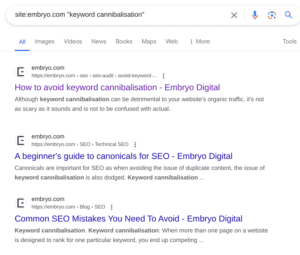Although keyword cannibalisation can be detrimental to your website’s organic traffic, it’s not as scary as it sounds and is not to be confused with actual cannibalism.
Mostly it’s inconvenient, after putting in so much effort to increase your website’s SEO, to have it undermined by competing keywords which confuse Google rankings. But with proper search engine auditing, there are ways not only to avoid keyword cannibalisation but to fix it if the deed has already been done.
So what is keyword cannibalisation?
Put simply, keyword cannibalisation is an overuse of keywords for increased SEO. If multiple pages are ranking for the same keywords, they’re forced to compete with each other for CTR (Click Through Rate). This diminishes the authority of your pages and presents the user with more content to trawl through to get the information they want.
Even though your website might be ranking in the top two spots, a user could click through to the third option instead because it presents a more in-depth explanation of what they’re looking for.
Keyword cannibalisation also undermines the useful SEO devices you’ve employed in the creation of your web page, such as backlinks and anchor text (the section of text you click to be diverted to another page) by forcefully splitting the links between multiple pages. This dilutes the backlink, instead of directing the website user to just one consolidated piece of information.
As well as diluting the links and content of your website, if multiple pages target the same keywords, this suggests to users that your content is limited and probably of poor quality.
How to find:
At a basic level, keyword cannibalisation occurs when two or more pages use the same keywords and fulfil the same intent. These pages thereby compete with each other for a higher CTR. Sometimes you might not even realise your website contains keyword cannibalisation until you’ve identified where the issues are.
One way we’d recommend finding cannibalised keywords is by creating a spreadsheet that lists all of your website’s important URLs and their associated keywords. Once you’ve identified the keywords for each URL, track down the list and look for duplicate entries. If there are multiple, your website likely contains keyword cannibalisation.
Another search option is to try typing the website name and the anchor keywords into the Google search engine in this format:
Eg. site:embryo.com “keyword cannibalisation”.

This should bring up instances where multiple pages on your website are ranked for the same keywords. You can also make use of external keyword research tools such as Ubersuggest, Google Trends, or Google Search Console.
If you’ve been writing into a CMS (Content Management System) such as WordPress or Silkstream, it’s worth noting that keyword cannibalisation can occur if the meta information in your title tag targets the same keyword as well.
How to avoid:
The best way to avoid keyword cannibalisation is by implementing a targeted keyword strategy into your business model. By optimising different pages to rank for different keywords, you’ll reduce the probability of multiple pages competing with each other for the top spot from the same website.
You can use what is known as “longtail keywords” in order to optimise each post rather than creating multiple content pages that rank for the same search query. These are longer anchor links that tend to generate less search volume but are more specific for what the user might be looking for.
An example of this might be optimising your page to rank for “how to avoid keyword cannibalisation” instead of “improve website rankings”.
You can also avoid keyword cannibalisation by tracking keyword rankings and performance. For this, you can use analytic tools such as Google Analytics or Ubersuggest.

Something to keep in mind when producing SEO-standard content is that the most important part of your website is the content you’re presenting, not the keywords. Focus on topic clusters that your audience will be interested in in order to prevent your website from straying from its marketing goals.
If you keep the content concise, accessible and relevant, the keywords will come more naturally. This is what distinguishes your website from AI and other search tools and results.
It’s also a good idea to combine potential questions about one specific topic into one page in order to eliminate the chances of web page competition and to ensure a good user experience. You can avoid making a blog post or web page too long by including a clickable table or links which direct viewers to another relevant part of your website
A conscious prioritisation of digital content will also provide an opportunity to interact with your audience and find out what they want. You could collect this data through customer surveys, feedback forms, or even social media polls. Don’t disregard audience tools like Quora, Reddit, and Google’s “People Also Ask” as ways of finding out what sort of content will keep your customers clicking.
You can also track keyword rankings by running content audits to make sure that any published material is still in line with readers’ interests and marketing goals. The aim is to prioritise relevance and accuracy and to use the best keywords to meet those SEO goals to enhance your website’s marketing strategy.
How to fix:
Sometimes you might find that your website contains accidental instances of keyword cannibalisation, try as you might to avoid it. If this does happen to you, there are a few things you can do to fix it.
The best and easiest way to fix keyword cannibalisation is to change content optimisation to make the pages rank differently. You can do this by restructuring content, or by changing or reducing keywords. Remember, it’s better to reword and restructure rather than remove keywords completely.
If the SEO on a page is creating more competition than it is bringing in organic traffic, it might seem like a good idea to delete the less relevant or less frequented pages to reduce overlapping content. However, this isn’t always an advisable strategy because this could eliminate other beneficial organic traffic that this page generates for your website. This could, in turn, lower the search value of your company. Instead of deleting it, you might want to try playing around with the page’s content to try and maximise SEO in a different, more beneficial, way.
An alternative to deleting is merging content. You can have the best of both worlds by simplifying or consolidating existing content to form a complete comprehensive web page that meets SEO standards without undermining your website’s accessibility.
You might also consider redirecting an older, outdated page to a more relevant one by going back in and substituting some of the keywords or restructuring some of the content in order to better reflect SEO best practice
What not to do:
Do not noindex a page.
‘Noindexing’ is tagging that page so that it doesn’t turn up in search engine results. This is the equivalent of mortgaging your house in a game of Monopoly to stop yourself from going bankrupt: although no one else can buy it or compete with that property, you can’t earn anything on it. It no longer generates any revenue, but it’s still part of the game.
It’s also not a good idea to canonicalise a web page as the solution to keyword cannibalisation. Canonicalisation creates a master URL to redirect all ranking signals to that original page. Unfortunately, this only works when multiple pages are near or exact duplicates. When each page has slight (but important) distinctions, you want to optimise as much concise and relevant information as you can, rather than reducing all potential search results to one URL.
Likewise, if you de-optimise a page by removing internal links with the cannibalising keyword, the other keywords on the page are also likely to be affected.
Don’t let your SEO eat itself
At Embryo we work to create unique content that targets individual terms that your audience is searching for.
For more on this contact us today.
FAQs
Is keyword cannibalisation similar to having duplicate content?
1. No keyword cannibalisation and duplicate content are distinct things. If there are two pages that could potentially be going after the same keyword (one might be a blog post, one might be a service page) this doesn’t mean that the content is the same, just the keywords. In this case, the intent for the pages is different. Whereas if your site has two pages which match for intent and keywords, this would be duplicate content.
Can I use a tool to check for keyword cannibalisation?
2. There are several tools. With Ahrefs you can see a timeline of results from the previous 3 months, 6 months, last year etc. This gives an indication of when other URLs started competing. You can also look back and see the changes in URL ranking for a keyword. SE Ranking is similar to this and is better for keyword tracking on a daily basis.
Should I make lots of different content or a few pieces of long content?
3. There is no set rule, but this comes down to how you best want to target. For example the legal sector, long content is more relevant. Look at what your competitors are doing etc. For example, simple instructions don’t need long forms 1000+ words plus. Word count always needs to match user intent.
Does Google penalise for keyword cannibalisation?
4. If you have pages which are both targeting the same keyword. Google will keep switching the URL. It is likely that both page’s rankings will drop to stop the competing keywords. There are different severity levels of keyword cannibalisation but you will ultimately lose out on traffic for the keyword.












